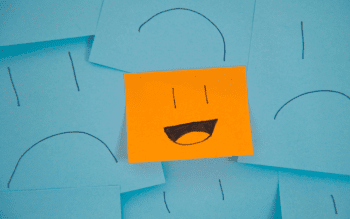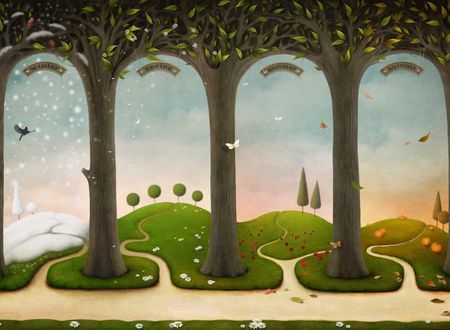Human life is like a pendulum. It is dangling and swinging between positive and negative opinions, good and bad, right and wrong, the true and the false, the highs and lows, thick and thin, and a whole heap of other dualities. All that is subjective, however. It cannot affect you unless you let it.
Let me narrate a little story to you:
There was a monk once. For years he practiced meditation, contemplation, and forbearance, yet he could not gain enlightenment. He still felt troubled by the world around him, especially when people failed to see his saintliness or disagreed with what he thought was the truth. He still felt bad when people mistreated him and had negative opinions about him, and, good when he was treated well. He wanted to rise above it, remain indifferent to such worldly offerings but he could not.
One day he approached his guru and confessed his inner turmoil and restlessness. His master listened patiently and gave him a key and directions to a certain room.
“Go and meditate there for three days unmoving. Leave the door open and maintain silence. The truth will dawn on you,” the master instructed.
He obeyed his guru and went to the place to meditate. Much to his dismay, it was in a market, next to a busy hallway, in the center of a crowded city. He was skeptical about meditating in a noisy place for inner quietude. Nevertheless, he proceeded. As soon as he unlocked the door, a nauseating stench greeted him. He soon realized that there was a toilet just above the room. For a moment he felt cross with his guru. Then again, the guru must have a reason, he thought.
The room was unclean, without any windows, and looked like an abandoned shop. There was seepage on the walls and the ground was somewhat wet. The waste pipe above was leaking. He assumed the lotus position and sat down to meditate. Every so often, he could hear the sound of a flushing toilet. He understood that he was meditating directly below a public toilet. His restlessness only built up more.
A million worries engulfed him. He was concerned about what would happen if the pipe above him burst, what the people who were passing by talked about him, how would he know when seventy-two hours had passed, what if he fainted from the stench, what if someone came and interrupted his meditation midway, and so on.
On the third day, while he was engrossed in such thoughts, the plumbing above him burst and some fecal matter fell on his head. Before he could determine his next step, two men walked by.
“Who is this man?” one asked in disgust seeing the monk smeared in excreta.
“God knows! Some claim he is a holy man while many say he is a shithead.”
The monk was enlightened as soon as he heard that. He understood that the whole world can only have one of the two opinions about him and everyone is bound to have some opinion. In essence, none of the opinions actually matter unless you let them. They cannot affect you or bother you unless you accept them. They cannot multiply unless you respond to them. Such opinions are not eternal unless you react towards them. They hold no intrinsic meaning unless you contemplate upon them. They cannot change you unless you cultivate them.
Everyone who knows you is going to have an opinion about you. Many who have no clue about you are likely to have an even stronger opinion about you. Those who meet you form opinions based on their experience. And many who have never met you, form theirs based on the opinion of others. Such is the nature of this material world. The biggest democracies, religions, sects, cults run on this principle. Everyone has the right to have an opinion. And you have the right to accept, reject, or ignore it. It is your choice that affects your state of happiness.
If you start listening to yourself, when your inner voice finds an audience in you, the outer ones matter less and less. When how you are seen by others and their opinions stops bothering you, a blanket of peace drapes, almost shields you. And the one who is peaceful is happy indeed. Happiness is the outcome of your actions, physical or mental. You may want to read – What is your opinion about yourself?
Know when, what, and where to keep hold versus let go. Such knowledge comes with practice, with awareness. It is about attitude and outlook. This is the journey of turning inward.
Peace.
Swami
Editorial Note
Do you know what one of the world’s best-kept secrets is?
Happiness is a choice. Literally.
Every single moment, one can make the choice to switch from sadness to joy.
In the words of the Bobby McFerrin classic,
“…In every life, we have some trouble.
When you worry, you make it double.
Don’t worry, be happy.
Be happy now.
Don’t worry, don’t worry, don’t do it,
be happy, put a smile on your face.
Don’t worry, it will soon pass, whatever it is,
don’t worry, be happy.”
Life’s best solution: stop worrying and be happy instead!
The mind’s penchant is worry. When a person is left alone with his thoughts, the first deluge of thoughts is always negative. So, admittedly, we can all use some life lessons in figuring out how to be happy.
Course
Art of Meditation
Free yourself from suffering and live life to the fullest. Learn the yogic technique of meditation in 4 days (and master it over a lifetime)
The following FAQs reveal the principles of happiness, how to rise above negativity and depression, and the ultimate secret of happiness!
What are the golden rules on how to be happy?
The secret of happiness is that there is no secret. It’s all out in the open. You think, speak and act in a manner that fosters happiness and you’ll be increasingly happy.

Happiness is a skill. It is something one has to acquire and cultivate. If you put in the hard work, you will see the results.
So, while there’s no secret of happiness, there are some guidelines on how to be happy. Here’s my two cents’ worth; five principles of happiness:
1. Be Sincere: Whether you are dealing with yourself or others, just be sincere. When you are sincere you are strong and dependable naturally. Mean what you say and say what you mean.
2. Read: When you read a book, you are getting a lifetime’s worth of wisdom in a little package. Even if you chance upon just one thought-provoking sentence in a good book, the way I see it, it’s paid for the whole book. Read good literature.
3. Exercise: When we exercise, our brain releases many neurotransmitters that help us feel light, happy, and stress-free. Exercising slows down aging, it stops your muscles from wasting away and grants you longevity.
4. Stop Complaining: It is extremely detrimental to our spiritual growth as well as emotional well-being. When complaining becomes a habit, everything just feels less. You want that little bit more, that little extra and the struggle starts.
5. The Fifth Principle: The fifth principle is something no one can tell you. It’s your personal guideline or commandment you set based on your own nature, circumstances, and goal. Write down your own principle.
Pick up more profound life lessons in 5 Principles of Happiness.
Why do humans gravitate more towards unhappiness?
The truth is that the source of all good and bad in our world stems from one thing. In my view, it is resistance. Just look around and you’ll find most of us lead a life of great resistance.

We are trying to resist other people, ideas, circumstances, beliefs, situations, and everything else we want to avoid. And, this leads me to the crux of the matter: what do I really mean by resistance? Here, in simple terms:
Almost every one of us has only two key problems in life. They are, in fact, the only two challenges. Eliminate these and you have discovered how to be happy. There is no resistance, no unhappy feelings, or stress.
1. First: people want something that they don’t have. Be it health, wealth, power, love, attention, or anything else.
2. Second: they have something that they don’t want. Once again, be it anything. We sail through, often against the winds, a life of several decades constantly working towards what we think we must have in our lives or evading what we think we shouldn’t have.
Continue reading Why Are We Unhappy? to understand how spirituality is a panacea for happiness.
Is there an ultimate secret of happiness?
Happiness is a flirtatious partner. You can’t bet on its loyalty or stability. Often we think happiness exists in my dreamland, a place where everything (and everyone) will move according to me. This is a lofty and ignorant view.

A life devoid of challenges and conflicts is not necessarily a happy life, in fact, it is immensely boring and will eventually lead to intense sadness and a big void. Our struggles teach us, they shape us.
We must have a reason to be happy. Our possessions and people are reasons to be happy, to be grateful, but they are not long-lasting reasons because they don’t really give meaning to our lives beyond a certain degree.
Friedrich Nietzsche contended, “He who has a Why to live for can bear almost any How.” Of all the lessons learned in life, this may just be the biggest.
If you have a reason to get out of bed every morning, you will. If you’ve got a reason to live, you will. If you’ve got a reason to love, you will. If you’ve got a reason to be happy, you’ll be happy. And reason boils down to one thing: meaning.
If your life has meaning, if your relationships have meaning, you’ll be fulfilled naturally. Meaning is the only light that dispels the darkness of emptiness.
And there are three ways to find meaning in your life:
1. Goodness
2. Service
3. Suffering
Continue reading The Secret of Happiness and learn more about these three life lessons.
Can one feel happy every single moment?
If you’ve ever wondered how to be happy all the time, the video below gives the answer. With the help of a delightful Akbar-Birbal story, Swamiji explains how to be happy all the time is a fool’s errand.
It’s impossible.

Timeline:
- 0:10: Can one always be happy?
- 3:03: Life needs challenges
- 3:37: The story of the man who brought bad luck
- 7:43: It’s okay to not be okay
How do I rise above negativity and be happy?
Negativity kills your motivation, it makes you weak and almost shuts down your mind. If you let negativity become your habit, you will mostly find yourself sulking.
Your mindset and your mental strength are the two most critical factors, the most important elements to help you come out of negativity.
Here are some suggestions for you. They are not mutually exclusive. Try a mix and match, a trial-and-error approach to see what works best for you.
- Focus on the positives
- Accept the situation
- Accept your mistake
- Focus on action
- Meditate
Allowing the opinions of others to affect us brings on negativity faster than anything else.
Negativity directly affects your consciousness, your mind, and therefore your body. In fact, it is a disease, a mental ailment. If you choose to stay negative, you will become a stress head, age quicker, and contract diseases faster.
Read more in 5 Ways to Come Out of Negativity.
What are some of the most effective ways to cure depression?
Before you get to the actual cure, please be aware that your depression is not the result of some overnight act and therefore cannot be fixed overnight (Click here for more depression quotes). You must not get depressed about not being able to quickly get rid of your depression. Be patient.
You can surely come out of it as easily as you went into such depression in the first place. But be very patient and relaxed about it. Know that it is your mind playing tricks and if you catch it red-handed, it will stop.
Just like happiness is a state of mind, so too is depression. And switching the state of mind is very much doable.
Let us get to the cure:
If you are not taking anti-depressants currently, half the job is already done. Please do not start taking such pills. They are soporific substances designed to artificially pacify your brain creating the illusion of a calm mind. Gradually, their dosage needs to increase as your brain gets used to it.
To not only completely get rid of depression but feel fitter than you have ever been, you need to cover all three aspects: body, consciousness, and the soul.
Continue reading about the cure in Depression: The Yogic View.
A GOOD STORY
There were four members in a household. Everybody, Somebody, Anybody and Nobody. A bill was overdue. Everybody thought Somebody would do it. Anybody could have done it but Nobody did it.
Don't leave empty-handed, consider contributing.It's a good thing to do today.









Comments & Discussion
10 COMMENTS
Please login to read members' comments and participate in the discussion.